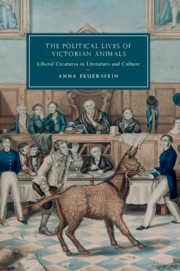Book contents
- The Political Lives of Victorian Animals
- Cambridge Studies in Nineteenth-Century Literature and Culture
- The Political Lives of Victorian Animals
- Copyright page
- Dedication
- Epigraph
- Contents
- Figures
- Acknowledgments
- Introduction
- Part I Anti-Cruelty Legislation and Animal Welfare
- Part II Democracy, Education, and Alternative Subjectivity
- Chapter 3 ‘Tame submission to injustice is unworthy of a Raven’
- Chapter 4 Alice in Wonderland’s Animal Pedagogy
- Part III The Biopolitics of Animal Capital
- Coda
- Works Cited
- Index
- Cambridge Studies in Nineteenth-Century Literature and Culture
Chapter 4 - Alice in Wonderland’s Animal Pedagogy
Democracy and Alternative Subjectivity in Mid-Victorian Liberal Education
from Part II - Democracy, Education, and Alternative Subjectivity
Published online by Cambridge University Press: 08 June 2019
- The Political Lives of Victorian Animals
- Cambridge Studies in Nineteenth-Century Literature and Culture
- The Political Lives of Victorian Animals
- Copyright page
- Dedication
- Epigraph
- Contents
- Figures
- Acknowledgments
- Introduction
- Part I Anti-Cruelty Legislation and Animal Welfare
- Part II Democracy, Education, and Alternative Subjectivity
- Chapter 3 ‘Tame submission to injustice is unworthy of a Raven’
- Chapter 4 Alice in Wonderland’s Animal Pedagogy
- Part III The Biopolitics of Animal Capital
- Coda
- Works Cited
- Index
- Cambridge Studies in Nineteenth-Century Literature and Culture
Summary
This chapter examines the political uses of animals in children’s literature, and connects them to understandings of alterity in mid-Victorian demands for democracy and debates over national education. I examine John Locke’s discussion of animals in children’s literature and education in Some Thoughts Concerning Education, to show how the inclusion of animals in children’s education positions them as educational and financial capital. I then analyze mid-Victorian debates about education in relationship to demands for democracy and show how theorists such as John Stuart Mill similarly brought alterity into the political sphere only to reject it. Lewis Carroll’s novel Alice’s Adventures in Wonderland, however, revises the role of animals in children’s literature and of alternative subjectivity in the political sphere. Instead of instructing children to conform to liberal ideology, Carroll’s unconventional animals educate Alice in undoing liberal subjectivity and appreciating the political potential of alternative subjectivities. The novel thus teaches readers that alterity is excluded from the political sphere precisely due to its ability to disrupt liberal ideology.
Keywords
- Type
- Chapter
- Information
- The Political Lives of Victorian AnimalsLiberal Creatures in Literature and Culture, pp. 134 - 160Publisher: Cambridge University PressPrint publication year: 2019



